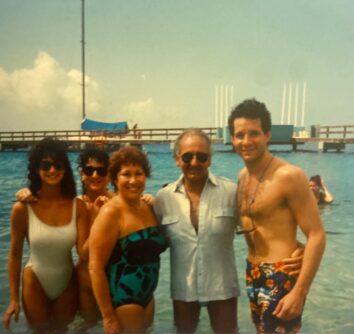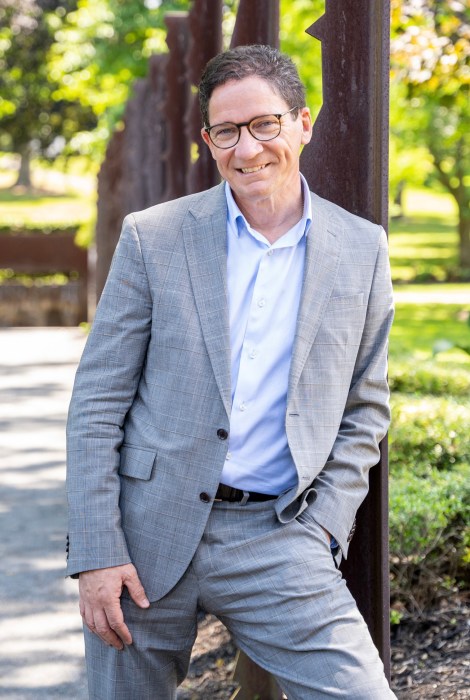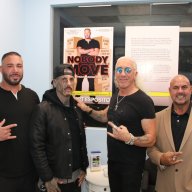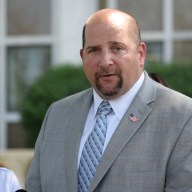By Dave Gil de Rubio
The American essayist George Saunders once said that what dads do is ease the burdens of those he loves. For actor Steve Guttenberg, that’s one of the many roles his late father Stanley played throughout his 89 years on Earth. It is recounted in loving detail in the younger Guttenberg’s new memoir, “Time to Thank: Caregiving For My Hero.”
In it, the former North Massapequa resident intersperses anecdotes about his father moving wife Ann Newman and three young children to the suburbs from Queens with Guttenberg driving between California and Arizona to help care for his father following the latter’s kidney failure diagnosis from 2019 to 2022.
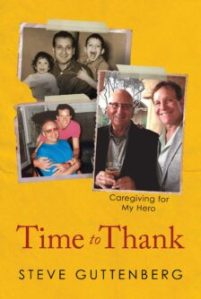
During the 10-hour one-way trips, the 65-year-old performer had time to ruminate about memories, mortality, and all the intangible gifts his father gave him. When he ran into fellow Long Islander Jake Steinfeld, at the meat counter of a local supermarket and the two were catching up, the fitness personality insisted Guttenberg’s experience was worth publishing.
“Jake hadn’t seen me in a long time and asked what was going on,” Guttenberg recalled. “I told him I was taking care of my dad and I told him about the drive and all that and he said he thought that was a book. He said he had a book agent named Jan Miller and wanted to introduce me to her. I told her my story and she asked me to write a few pages and that she was going to sell it. Before I knew it, I was writing a book.”
A former U.S. Army Airborne Ranger and New York City police officer, Stanley Guttenberg was a Brooklyn native whose love of bodybuilding and gregarious nature immeasurably shaped his son’s outlook and approach to life. Humility, loyalty, love of family and kindness—these are many of the hallmarks you’ll find in the anecdotes in “Time to Thank.” And despite having a seemingly rough exterior, Stanley Guttenberg’s thoughtful nature with his son resonated whether it was when the former gently handled his son dismantling the dashboard of the new family car and dishwasher within a week of each other when Guttenberg was about eight years old or counseling him later about the nature of friendships when his son’s career success started snowballing in the early ‘80s.
“He was a soldier and a policeman who knew how to control himself,” Guttenberg said. “And even before that when he was a young man before that training, he knew how to control himself. He would always bring me upstairs [whenever I did anything wrong], sit me down and say, ‘What’s wrong with you Steven?’ And I would say, ‘I don’t know.’ And he would say, ‘Don’t do that again.’ And I said ‘Okay’ and that was it.”
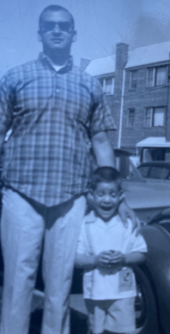
Long Island is never far from Guttenberg’s lips and prose. There was a trip to Adventureland when eight-year-old Guttenberg saw a case of road rage from another motorist lead to his father being assaulted before he knocked the assailant out and helped the man’s wife load her husband into the car before father and son completed their trip to the amusement park.
Or getting gas with his pop during the OPEC crisis when Guttenberg was learning how to drive and swinging by an Exxon on Hicksville Road whose owner Russ was tight with the Guttenbergs and allowed them to hop the line to fill up. Or when the Plainedge High School alum recounts local eateries like Pappalardos Pizza Cove, Seaford Del and All American.
But when you talk about the connection with his father, it becomes a palpable presence. Sitting across from the star of the Police Academy franchise, the trance-like manor he goes into quickly transports you to a memory like his learning how to drive.
“It was at a big industrial park in Syosset right off the Seaford-Oyster Bay Expressway right on Jericho Turnpike,” Guttenberg shared while staring off into the distance. “My dad taught me how to drive there. I still remember the sound the tires made when they met the ground. It was summer and how sweet the air felt and how the smooth resin of the steering wheel felt on my hands. And my dad next to me, shaking his head up and down or ‘no’ when I was trying to parallel park and I hit the curb. We would drive in empty parking lots too, because on Sundays, the stores were closed. Once in a while, he’d let me drive on a small side street because he trusted me. I remember he’d end the session by saying we should go get something to eat. We would switch places and he would drive. He was a good dad.”
Having to recount the suffering his father went through towards the end of his life made Guttenberg experience some emotional and painful moments while writing this book.
A big part of that seeing the suffering his father went through after falling on his hip and breaking his hip after tripping in the middle of the night after bypassing his hated walker. But it also reminded Guttenberg of all the things that made him cherish his father—his being a solid listener, a great stop-and-chat guy, his intelligence and curiosity fueling his ability to get an accounting degree when he was 65 and a robust vibrancy that found him doing handstands for 10 to 20 minutes at a time. And most of all, the happiness and love he had for family, friends and the life he got to experience.
“One of the most difficult things I had to deal with was remembering how much pain my dad went through especially at the end,” Guttenberg said. “His pain was so bad that they filled him with all these drugs to take away the pain. It messed up his brain and he was just so angry. He was in the hospital and didn’t want to be there. But my takeaway for all of this is that he lived a really meaningful and physical life. He enjoyed the smell of the summer wind coming at the end of May and loved to take my mom for a drive on the North Shore in Roslyn, Great Neck and Oyster Bay, where they would go to the little candy store. He used to love driving around Bethpage Restoration Center and going out to the Hamptons looking around. He was a caring guy and when you have a caring person in your life, you take care of them like gold. And that’s why I took care of him towards the end of his life because he was so valuable. There was nobody like him. Nobody cared about me, except my mom, like he does.”



